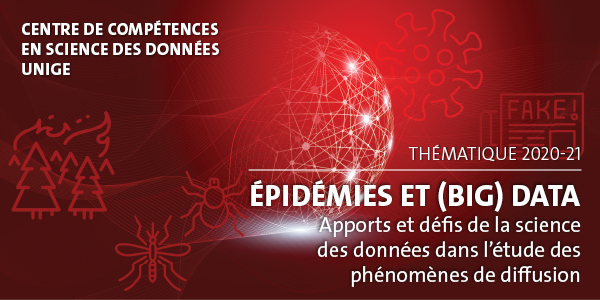Launch of the Center and of the annual theme

Launch of the Center and the annual theme
Dear colleagues,
As you know, the Data Science Competence Center (CCSD) of the University of Geneva will be launched in September 2020, in order to encourage interdisciplinary exchanges around data processing within the research community of our university.
Hereby, I am pleased to invite you to the launch session of the Center, which will take place on September 4, 2020 between 12 p.m. and 2:30 p.m., in a location yet to be defined.
Each year, the CCSD also intends to lead a collective reflection on the deepening of a particular theme. As a common thread running through some of the activities organized by the Center, this theme is meant to be precise enough to favor a significant scientific contribution and a rich dialogue, but also transversal enough to allow interdisciplinarity.
For the 2020-21 academic year, the theme will be "Epidemics and (Big) Data: contributions and challenges of data science in the study of diffusion phenomena". By not confining itself to the sole health dimension of epidemic phenomena, this theme allows, as you will discover in the following summary, to build bridges between researchers from many academic horizons, while exploring the three research axes of Center, namely the science of data as a knowledge, as a tool and as a research object.
In this regard, the launch session of the Center will also be an opportunity to initiate this collective reflection, by carrying out an overview of the projects and initiatives carried out by UNIGE collaborators in connection with the annual theme.
In order to organize this meeting, I invite you to complete the short registration form present under this link before August 19, 2020. This form will allow you to specify whether you wish to attend the launch session and / or participate in the annual debate. So do not hesitate to fill it out even if you are not available on September 4, 2020.
Looking forward to seeing you in September, I wish you, dear colleagues, a lovely day and a great summer.
Best regards,
Guive Khan-Mohammad, PhD CCSD Program Manager
2020-21 Theme : Epidemics and (Big) Data In many ways, the COVID-19 epidemic, which spread around the world from the first quarter of 2020, underscored the importance of access to quality data and relevant models in the understanding and management of epidemic phenomena. Whether it was to establish projections of infectious chains in given populations, or even to adapt the structural response of hospital environments, data science has provided decisive tools.
However, such an observation goes far beyond the domain of health alone, while the study of diffusion phenomena has long gone through research questions fed by many disciplines. This notably applies to the study of the dissemination of fake news in the social sciences, the scientific interest in the effects of contagion between financial assets in economic sciences, the analysis of the expansion of certain animal species in biotopes by the life sciences, the energy transmission between atoms in science, or the study of international circulation and phenomena of diffusion of cultural goods in human sciences.
Certain advanced statistical and computer-based approaches and methods used to study epidemic phenomena are thus developed, discussed and refined within numerous research projects involved in specific disciplinary questions, without their advances necessarily being shared between disciplines, even if this sharing could be fruitful.
At the same time, while the methods and tools of data science make it possible to refine the understanding of many complex phenomena of diffusion, its use, - and this in particular in the case of the epidemic of COVID-19 -, does not go without asking questions about how to produce and use data, and the size of the corpus accessible. On these questions, critical approaches, such as they can be developed within disciplines such as law, social sciences or ethics, impose themselves as an indispensable dimension of data science.
As part of its 2021 edition, the UNIGE's Data Science Days planned for the month of June thus propose to build on the experience of the COVID-19 crisis to initiate an interdisciplinary and critical reflection, on the one hand, on the innovative methods used in the study of dissemination phenomena and, on the other hand, on the legal, political, social, economic and ethical issues linked to the use of (big) data in the management of epidemic phenomena. In this perspective, a call for participation is launched for the community of UNIGE researchers, all disciplines combined.
Milestones in the annual reflection Step 0: Plenary meeting of the Center - April 2020
Step 1: Launch session - September 2020
Registration via the form available under this link: before August 19, 2020
Step 2: Call for research project - September-October 2020
In return, it will be expected from the researchers who obtained this stimulus fund:
Submission of the research project: 30 October 2020
Response from the fund allocation committee: 30 November 2020
Step 3: UNIGE's Data Science Day - June 2021
 |
